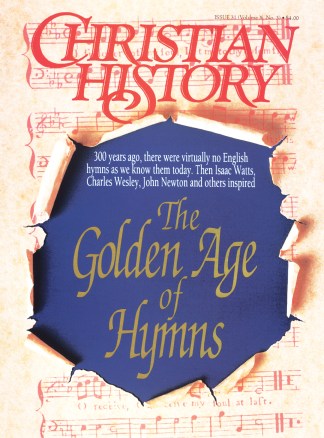The roots of early Christian worship grew in the soil of the first-century Jewish synagogue service. In Scripture and psalm, in sermon and prayer, the gathered community celebrated what God had done—and anticipated God’s mighty acts yet to come. In light of this, the well-known hymn “The God of Abraham Praise” offers a glimpse of history.
Thomas Olivers (1725–1799), the hymn’s author, was born in Wales and orphaned at age 4. Apprenticed early to a shoemaker, he grew to adulthood a wild, rootless man.
In his mid-twenties, however, Olivers was converted through the preaching of George Whitefield. Soon after, he became an evangelist with John Wesley. Olivers spent more than twenty years—end 100,000 miles—as an itinerant preacher. Later, he became co-editor of Wesley’s Arminian Magazine.
In the Great Synagogue
Tradition tells us that on a Friday evening in 1770, Olivers attended Sabbath worship at the Great Synagogue, Duke’s Place, London. There, as the “Yigdal” (traditional Hebrew doxology) was sung by cantor Meyer Lyon (d. 1796), Olivers was so moved that he approached the operatic vocalist personally. In the mid-eighteenth century, cantors had begun to use musical notations, especially for new and popular compositions, and Lyon graciously provided Olivers with his tune (Leoni).
The Methodist preacher then adapted the text of the Jewish doxology (which was based on the Thirteen Articles of Faith stated by famous Jewish philosopher Moses Maimonides in the twelfth century). The opening word, yigdal (Hebrew for “may He be magnified”), inspired Olivers’s free rendering. The resulting work, “A Hymn to the God of Abraham,” was printed in leaflets and found instant approval in the churches.
A 12-Stanza Hymn
Here are four representative stanzas from the twelve originally composed by Olivers:
The God of Abrah’m praise,
Who reigns enthroned above;
Ancient of everlasting days,
And God of Love:
Jehovah Great I Am!
By earth and heav’n confest;
I bow and bless the sacred Name,
For ever bless’d.
There dwells the Lord our King,
The Lord our Righteousness
(Triumphant o’er the world and sin),
The Prince of Peace;
On Sion’s sacred height,
His Kingdom still maintains;
And glorious with his saints in light,
For ever reigns.
The God who reigns on high,
The great archangels sing,
And “Holy, holy, holy,” cry,
Almighty King!
“Who Was, and Is, the same;
“And evermore shall be;
Jehovah—Father—Great I Am!
“We worship Thee.”
The whole triumphant host,
Give thanks to God on high;
Hail, Father, Son, and Holy-Ghost,
They ever cry;
Hail, Abrah’m’s God—and mine!
(I join the heav’nly lays,)
All Might and Majesty are Thine
And endless Praise.
Two in Harmony
Later years brought trials to the two men. Olivers, in 1789, was dismissed from the press by Wesley, and he retired in London. Lyon had to resign after singing in Handel’s “Messiah”; later he became reader in the Kingston, Jamaica, synagogue.
Jewish-Christian relations over the centuries have been often problematic, sometimes tragic. But today the singing of “Yigdal” in the synagogue, and “The God of Abraham Praise” in the churches, invites the memory of two who were in harmony as they sought to praise the Lord of All.
Dr. James D. Smith III is Senior Pastor of Clairemont Emmanuel Baptist Church and Adjunct Professor of Church History at Bethel Seminary-West, both in San Diego. He is a member of the advisory board of Christian History.
Copyright © 1991 by the author or Christianity Today/Christian History magazine.Click here for reprint information on Christian History.










